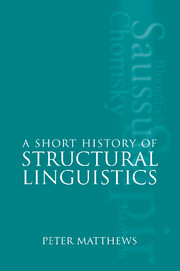8 - Structuralism in 2000
Published online by Cambridge University Press: 03 December 2009
Summary
Is structural linguistics still a living movement, and if not when did it die? The answers will depend on what is meant by ‘structuralism’; and, as we found at the outset, that is not straightforward. But for many commentators its creative phase has long been over. Its heyday lasted from the 1930s, when it was named, to the end of the 1950s; and, throughout that period, linguistics was dominated by it. But structuralism in America is said to have been overturned by Chomsky, and by the 1970s his hegemony was world-wide. Other programmes have emerged since, some opposed to and some simply independent of his. But few have reasserted views that he rejected. Therefore structuralism, as an active source of ideas, is indeed dead.
This account should not be seen as an Aunt Sally. Most linguists do not now describe themselves as structuralists, even if they work in fields like phonology, or with units like the morpheme, that the movement defined. When they refer to ‘structuralist approaches’ to their subject, they will mean ones that have been superseded since the end of the 1950s. To follow these overtly would not, therefore, be a good career move. But if linguistics is no longer officially structuralist, many linguists are still strongly influenced by structuralist ideas. These concern, in particular, the notion of a language as a system and the autonomy of linguistics as defined by it.
The structuralist bible is, by long consent, Saussure's Cours.
- Type
- Chapter
- Information
- A Short History of Structural Linguistics , pp. 142 - 153Publisher: Cambridge University PressPrint publication year: 2001



